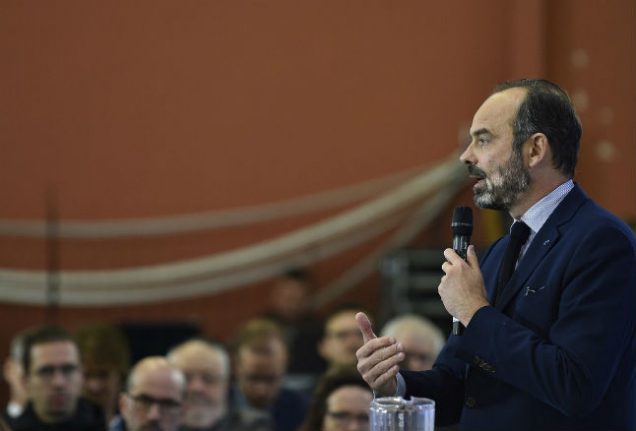- How do French pensions compare to the rest of Europe?
- Strikes: Transport chaos continues across France
- France: Macron to hold crisis talks on pension reforms
PENSIONS
Christmas mayhem feared as French transport strike continues
France reeled under a crippling public transport strike for a 10th day Saturday aimed at forcing the government to scrap a pension revamp, as fears grew of travel mayhem during Christmas.
Published: 15 December 2019 08:27 CET

French Prime Minister debates the pension reform with teachers on Friday. Photo: Jean-Christophe Verhaegen/AFP
Train traffic was severely disrupted with only one out four TGV high speed long-distance trains and three of 10 regional trains running across the country.
But Paris and its environs remained the worst hit. Nine metro lines in the capital remained closed and there were skeletal transport services between the city and its suburbs. Only 60 percent of the city's bus services were running.
Strikers have warned of similar disruptions on Sunday and Monday and national rail operator SNCF and the RATP Paris transport network confirmed service would be very limited with just one in four TGVs running.
On Saturday, SNCF managing director Rachel Picard, told Le Parisien daily that “half of the passengers” would have trains to visit family for Christmas” but did not elaborate.
Unions are hoping for a repeat of 1995, when they forced a rightwing government to back down on pension reform after three weeks of metro and rail strikes just before Christmas.
The prospect of a protracted standoff has businesses fearing big losses during the crucial year-end festivities, and travellers worried that their holiday plans will fall through.
READ ALSO:
On Friday, Prime Minister Edouard Philippe asked SNCF chief Jean-Pierre Farandou to draw up a list of exactly which trains would be running during the festive season.
The prospect of a protracted standoff has businesses fearing big losses during the crucial year-end festivities, and travellers worried that their holiday plans will fall through.
Philippe told the Parisien daily in an interview for its Sunday edition that the French would not accept being “deprived” of festive transport options.
“I can well see that everyone is worried as they see Christmas near. Christmas is an important time,” he said.
“Everybody must take their responsibilities. I do not think the French would accept people depriving them of this moment,” Philippe warned.
But unions said they would not give in — and that the government would have to.
“If the government wants the conflict to end before the holidays, they have all of next week to take the wise decision and scrap the point-based pension plan,” Laurent Blum, the general secretary of the hard-line CGT-Cheminots, the main SNCF union, told AFP.
'Deeply unfair'
France's moderate CFDT union joined the action after the government's announcement that those who retire before the “pivot age” of 64 would not receive a full pension.
“It's very simple: for the CFDT to take another look at this bill, the government must agree to withdraw the pivot age. One point, that's all,” CFDT leader Laurent Berger told Le Journal du Dimanche.
“It is deeply unfair to ask those who were born in 1960 and who are due to retire in 2022 to work longer,” he added.
If the government does not give ground, the CFDT will also call for industrial action in January, after Tuesday's strike, said Berger, who is not opposed to reform of the current pension system.
Berger said CFDT railway workers did not want a strike over the holiday season.
“I don't wish to block transport for Christmas. We should not make users pay the bill… We have to break this deadlock,” he said.
The prime minister has held talks with union leaders and more negotiations are scheduled over the coming week.
Philippe on Friday struck a combative note, saying he “has absolutely no fear of implementing this reform”.
The architect of the overhaul, pensions commissioner Jean-Paul Delevoye, has been hit by suspicions of conflicts of interest after several omissions in his declaration of interests, which he has since amended.
Under the French constitution, members of the government are prohibited from carrying out “any professional activity” in addition to their official functions.
The prime minister however stressed Saturday that he had faith in Delevoye and dismissed talk of his resignation.
President Emmanuel Macron's government insists the changes will make for a fairer system and help erase pension-system deficits forecast to reach as much as 17 billion euros ($19 billion) by 2025.
The average French person retires at just over 60 — years earlier than most in Europe or other rich OECD countries.
Train traffic was expected to be severely disrupted Sunday with only one out four TGV high speed long-distance trains and a third of regional trains running across the country, operator SNCF said.
But Paris and its environs remained the worst hit. Only the two driverless Metro lines in the capital were going to be in operation and there were skeletal transport services between the city and its suburbs.
Url copied to clipboard!


 Please whitelist us to continue reading.
Please whitelist us to continue reading.
Member comments